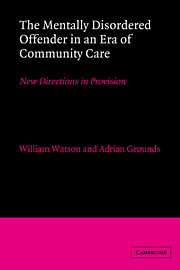Book contents
- Frontmatter
- Contents
- Conference participants
- List of tables and figures
- Preface
- Part I Introduction
- Part II Future directions for psychiatric services and mental health law
- Part III Perspectives on future needs
- 5 The mentally abnormal offender in the era of community care
- 6 New directions for service provision: a personal view
- 7 Defining need and evaluating services
- 8 Black people, mental health and the criminal justice system
- 9 A view from the probation service
- 10 A view from the prison medical service
- 11 A view from the courts: diversion and discontinuance
- Part IV Planning and implementing new services
- Part v A concluding review
- Refences
- Tables of cases
- Index
11 - A view from the courts: diversion and discontinuance
from Part III - Perspectives on future needs
Published online by Cambridge University Press: 05 August 2016
- Frontmatter
- Contents
- Conference participants
- List of tables and figures
- Preface
- Part I Introduction
- Part II Future directions for psychiatric services and mental health law
- Part III Perspectives on future needs
- 5 The mentally abnormal offender in the era of community care
- 6 New directions for service provision: a personal view
- 7 Defining need and evaluating services
- 8 Black people, mental health and the criminal justice system
- 9 A view from the probation service
- 10 A view from the prison medical service
- 11 A view from the courts: diversion and discontinuance
- Part IV Planning and implementing new services
- Part v A concluding review
- Refences
- Tables of cases
- Index
Summary
Introduction
In 1967 a study was carried out examining women remanded for medical reports to Holloway Prison (Dell & Gibbens, 1971). Less than 9% received a hospital order and not more than another 10% were sentenced to imprisonment or borstal training. Thus 80% of the women sent to prison for medical examination were released into the community after the remand period. The most likely reason was that the time spent on remand in custody had exceeded the likely punishment for the offence. Gibbens et al. (1977) went on to describe the medical remand procedure in some detail and to compare the court practices in London and Wessex. He found that, in London, magistrates remanded more defendants for medical reports and a disproportionate number of those were remanded in custody. However, smaller numbers of the London defendants received a hospital order or a probation order with a condition of treatment compared with those in Wessex. One conclusion drawn from this study was that the busier the court the more likely a remand in custody for medical reports. Bowden (1978) studied a sample of men remanded into custody for medical reports during a three month period in 1975. He described a recidivist population with previous offences for theft, drunkenness, vagrancy and violence, with frequent short periods of imprisonment. He noted they had similar characteristics to habitual drunken offenders and vagrants. A medical recommendation was associated with presence of mental illness and previous admissions to psychiatric hospital, and an absence of alcohol abuse or an extensive criminal record. His assertion that hospitals would only accept the better risk cases is supported by Binns et al. (1969) who compared mentally disordered offenders who were remanded to hospital under s.54 of the Mental Health (Scotland) Act 1960 with those medically remanded in custody.
Has the situation changed since those studies were carried out? The answer depends on which prison is looked at. For example, at Holloway Prison the picture has changed dramatically since Dell and Gibbens' study carried out in 1967. Over the three years 1986-1989 approximately 20-25% of medical remands have received a hospital placement. For the period April 1988 to March 1989 of 516 medical assessments, there was 136 placements in hospital (N. Hindson, personal communication), a rate of 26% which is far in excess of the figure of 9% found by Dell and Gibbens.
- Type
- Chapter
- Information
- The Mentally Disordered Offender in an Era of Community CareNew Directions in Provision, pp. 135 - 146Publisher: Cambridge University PressPrint publication year: 1993



